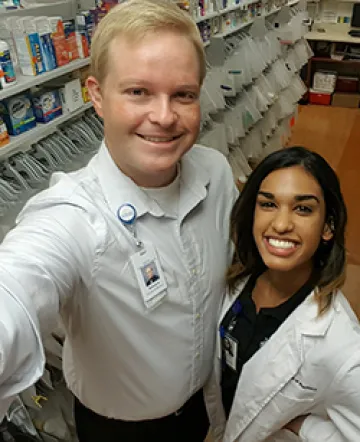To address health-related workforce shortages in rural areas, the Arizona State Legislature created the Rural Health Professions Program (RHPP) in 1996, to provide pharmacy and other health professional students with training experiences in rural communities throughout Arizona.

The College of Pharmacy has recently merged this program into a certificate program. Successful participants in RHPP will receive a Certificate in Pharmacy Related Health Disparities. While this certificate will not appear on a student’s transcripts, a certificate suitable for framing and special distinction will be awarded. Participants in the program receive a small stipend to defray the costs of traveling to and from their IPPE rotation sites and receive housing assistance as needed.
The RHPP/Certificate program also offers students the opportunity to experience diverse patients, communities, and regions and to travel and explore the many recreational, cultural, and social opportunities that exist outside Arizona’s major metropolitan areas. Participating students also have priority selection for their IPPE rotation sites and dates.
This program is generously supported by the ARIZONA AREA HEALTH EDUCATION CENTER (AZAHEC) and the MAX & MOLLY BLANK Rural Health Program Endowment. Successful participants in RHPP will be awarded the Max & Molly Blank Professional Certificate in Pharmacy Related Health Disparities.
Certificate Requirements
Experiential Course Requirements (3 courses, at least 9 units total):
- PHPR 801B and PHPR801C - Introduction to Pharmacy Practice Experience (IPPE) - Completed in a rural Arizona setting during the summers between 1st and 2nd year and 2nd and 3rd year
- One of the Advanced Pharmacy Practice rotations must be completed in a rural Arizona setting during the 4th year. If a student is unable to complete PHPR 801B or 801C in a rural Arizona location, the student may complete an additional APPE course in a rural location
Classroom Course Requirements (2 courses; 4 units total):
Introduction to Community Assessment for Pharmacy (2 units)
This graduate-level pharmacy course requires students to prepare key elements of a community health assessment, with an emphasis on pharmacy services, for a rural Arizona community of their choice. Students will use secondary data-like census and state vital statistics to examine their chosen community’s health status. Additionally, students will collect primary data using: surveys, key informant interviews, focus groups, and a windshield survey. Students will prepare a written report that summarizes and analyzes their findings in order to suggest possible topics for future pharmacy research or interventions within their selected rural community. This report will be shared in a presentation to the student’s academic and community colleagues.
PHPR 828 Pharmacy Health Disparities in the US (2 units)
This course will address health disparities, and pharmacy health disparities specifically, by critically analyzing historical, political, economic, social, cultural, systems, and environmental determinants that have produced inequitable health status or health care delivery. While racial/ethnic disparities in health and health outcomes will be an important focus of this course, disparities among other subgroups (e.g., rural/urban, lower socio-economic status, uninsured, disabled, etc.) may also be included and discussed. Health disparities and their relevance to pharmacists and pharmacy practice will be emphasized.
The map below depicts locations where RHPP students have gone on rotation in the past. It is by no means an exhaustive list. Rotation placements depend on site and preceptor availability and student interest. Placements change from year to year.




